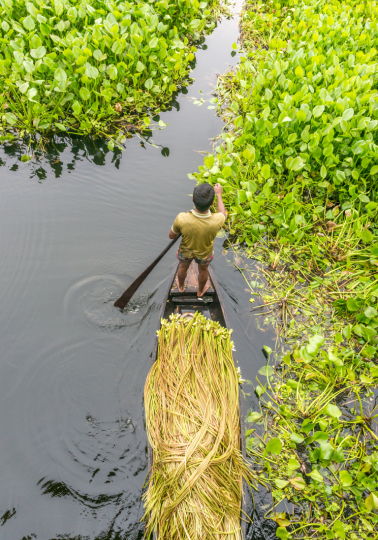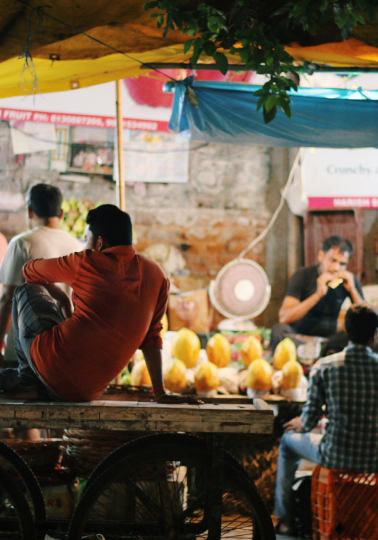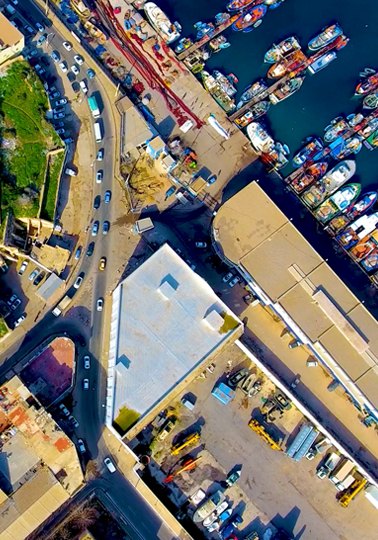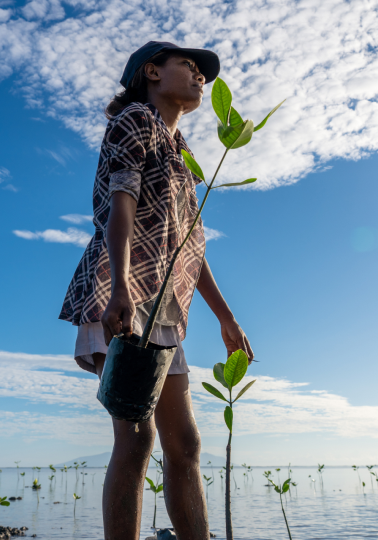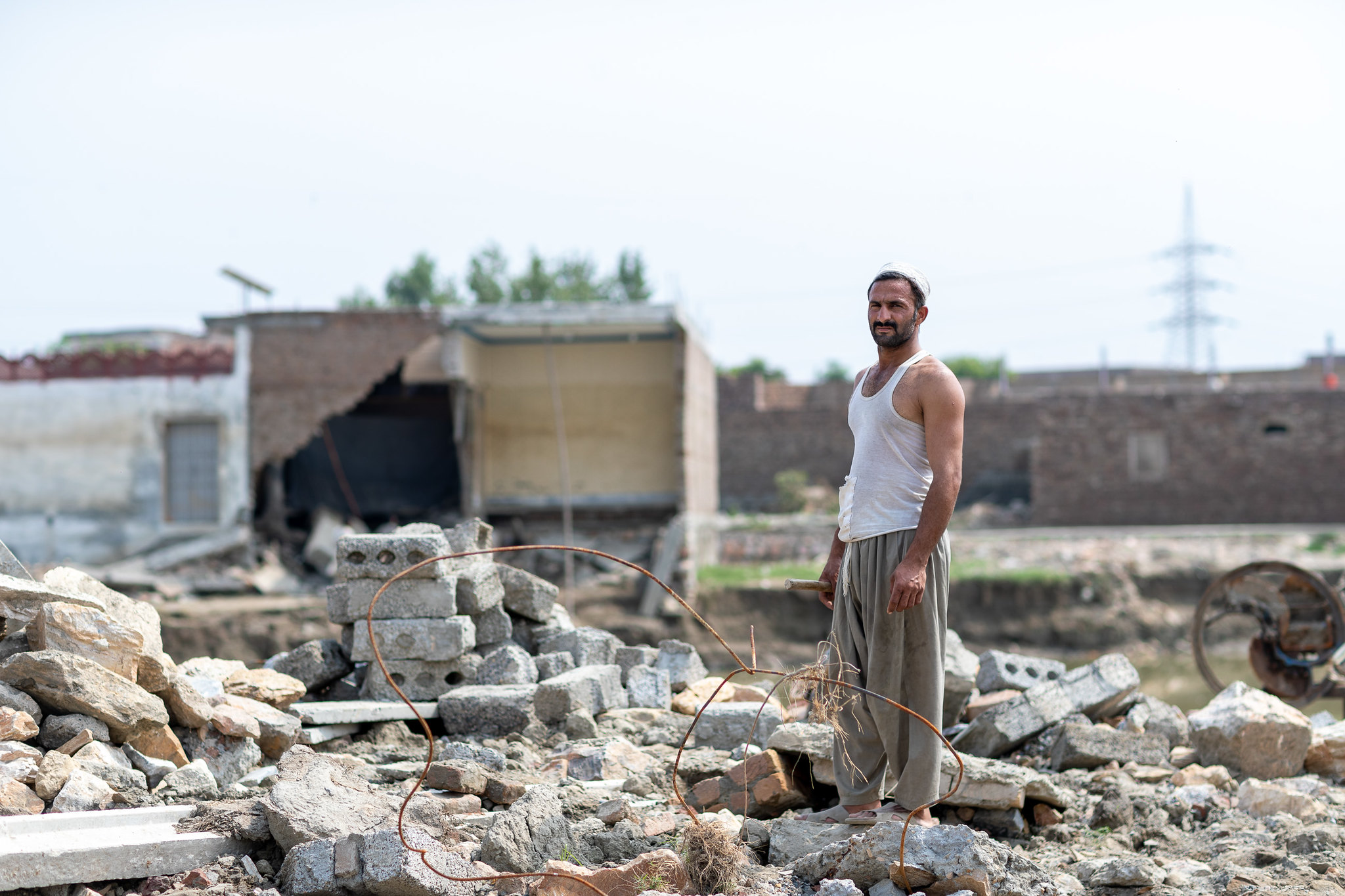Takaful - Delivering Financial Resilience to 100 million people by 2030
Insurance penetration remains low in most developing countries as less than 7% population access any type of insurance products in these countries, and 95% of risks remain uninsured. Access to insurance is further restricted in most countries with sizeable Muslim population as people remain reluctant to buy insurance due to socio-cultural and religious reasons.
The top five countries with Muslim majority population – Indonesia, Pakistan, Bangladesh, Nigeria and Egypt – have a combined of approx. 1 billion people and less than 2% of people with access to insurance.
Takaful - Building Financial Resilience against Climate Risks
- Access UNDP's Offer on Takaful here.
Takaful is a Shariah-compliant alternative to insurance based on solidarity, joint indemnity, and shared prosperity, consisting of its members contributing to a mutual fund to guarantee against potential loss or damage. Although Takaful has been around for almost five decades, it still only accounts for only approximately 2% of the total global Islamic finance assets.
Takaful, an often-overlooked cornerstone of financial resilience, holds immense potential that must be harnessed on a larger scale. While the growth of shariah-compliant assets is expected to soar, reaching a global total of US$5 trillion by 2025, the Takaful sector lags within the expansive realm of Islamic finance, currently representing only 10% of the overall assets. And even while the global Takaful market is poised to grow, with a projected total market volume of $97 billion by 2030, it remains small compared to some of the prominent conventional global insurance companies who underwrite that value in premium every year just on standalone basis. Takaful remains a vastly under-utilized tool for financial resilience.
Takaful offers an Islamic alternative to insurance that can foster financial resilience within these vulnerable segments. It holds substantial potential to provide shariah-compliant risk protection where it is most crucially required in the face of amplifying global hazards due to climate change. It can play a pivotal role in diminishing public losses and shielding the risks to livelihoods, health, agricultural yield, and livestock belonging to households, farmers, and small enterprises that confront shocks without the refuge of conventional risk protection or financial safety nets.
Takaful can reinforce resilience by diffusing risks and unlocking economic protection through the expansion of access to inclusive risk transfer tools aligned with Islamic values for millions of underserved individuals. With low insurance penetration and the incongruence of traditional insurance with cultural values rendering numerous Muslim communities susceptible to uninsured risks, strategic utilization of Takaful solutions can broaden the scope of inclusive risk protection to underserved groups. Targeted nurturing of the Takaful sector can extend comprehensive climate risk protection to vulnerable Muslim populations typically underserved by conventional insurance models.
Strategic collaborations capitalizing on Takaful's growth trajectory can furnish scaled risk protection exactly where it is most essential. This may encompass solutions for sovereign-level risk transfer, the crop and livestock sectors, and the bundling of Takaful offerings with Sukuk, Islamic credit, and microfinance services. Investment in product development, distribution infrastructure, and an enabling policy environment stands as imperative to realizing Takaful's potential for just and sustainable development.
A global collaboration on Takaful can strengthen the financial resilience of vulnerable communities and households in countries with sizeable Muslim population by bringing together the policymakers, and demand and supply-side stakeholders, and donors. This can be achieved by providing the enabling environment for Takaful solutions, developing innovative Takaful products, and developing market activities for communities.
Takaful Roundtable 1
On September 5, UNDP, together with Kuwait Finance House hosted the first Takaful Alliance Roundtable in Kuwait City, bringing together government officials, industry and research communities to discuss how Takaful can build the financial resilience of 100 million people by 2030.
At the first roundtable, more than 50 participants explored Takaful, its mechanisms, and the potential to expand to a greater portion of the vulnerable communities, exposed to growing risks in the world. The objectives of the roundtable were achieved with relevant stakeholders sharing key recommendations and challenges while recognizing the need to come together to pool expertise, resources, capacity, and vision to achieve greater financial resilience for vulnerable communities around the world that don’t normally have access to insurance.
Takaful Roundtable 2
The 2nd Leaders Roundtable took place in Riyadh, Saudi Arabia on October 9th, 2023, as part of the MENA Climate Week. The event happened after the 1st Leaders Roundtable that took place in Kuwait City on September 5th, 2023, where the initial concept of the global Takaful Alliance was discussed by stakeholders from various countries representing governments, regulators, donors, Islamic financial institutions, academia, Takaful and Retakaful providers.
At the second roundtable, diverse stakeholders, including industry experts, development leaders, Takaful experts, and foundations, have reaffirmed their commitment to reducing the financial vulnerability of 100 million people in countries with significant Muslim populations by 2030. A key highlight of the event was the discussion around forming a global Alliance aimed at enhancing financial resilience through innovative Takaful solutions in developing countries. The goal: develop at least 50 tailored Takaful products to address the needs of these markets.
COP28 Event
Delivering Financial Resilience to Climate Risks through Takaful
Hosted by UNDP’s IRFF, Islamic Development Bank (IsDB), IsDB Institute and UNDP’s Regional Bureau for Arab States (RBAS) in partnership with Kuwait Finance House (KFH) and the Arab Gulf Program for Development (AGFUND)
Wednesday, December 6th 2023, 15:30 - 17:00 (GMT+4), Joint MDB pavilion
Brought to realization through a shared vision and collaborative effort between UNDP’s IRFF, UNDP’s Regional Bureau for Arab States (RBAS), KFH, AGFUND, IsDB and IsDB Institute, this event will highlight the opportunity for Takaful (a shariah-compliant insurance alternative) to build the financial resilience of vulnerable communities, especially in countries with significant Muslim populations. A new IsDB and UNDP report on ‘Insuring a Sustainable Future: Building climate resilience through Takaful’ will be launched at the event, alongside commitments to further develop a global Alliance for Takaful.
Read more: COP28 Takaful Event
Way Forward
UNDP is committed to the development and implementation of the Alliance, and deeply appreciates the invaluable support of both KFH and AGFUND to convene the roundtables and advance the development of the Alliance to its current state.
To operationalize the Alliance, the next steps will be to raise resources for the central management and development of the Alliance's governance framework, managing meeting coordination with governments and stakeholders, communication, and outreach activities, convening additional technical and financial resources, and creating an initial project country and project pipeline for developing Takaful solutions in response to climate risks in target countries.
To facilitate this, the IRFF will initiate an external assessment of the proposed Alliance’s structure and governance. Interested collaborators will have the opportunity to examine and provide input on the final proposition.
Working closely with roundtable participants, UNDP will also craft an official document for prospective Alliance members to endorse, defining the roles and responsibilities of its members. This document will comprehensively outline the implications of becoming part of the Global Takaful Alliance, either through technical support or financial contributions, clarifying the associated responsibilities and expectations of different types of membership.

